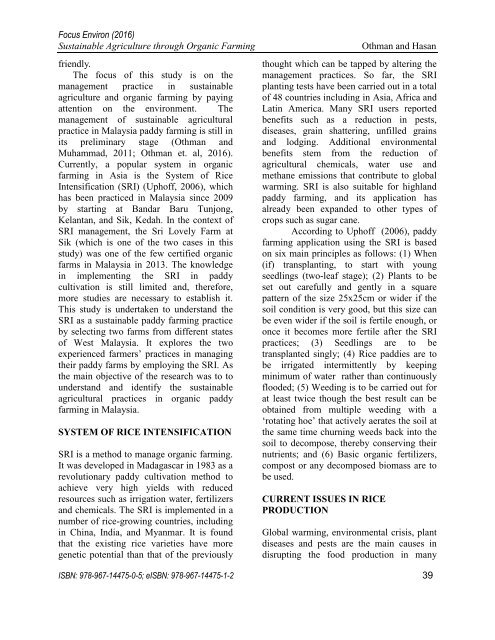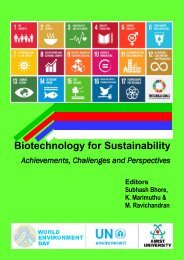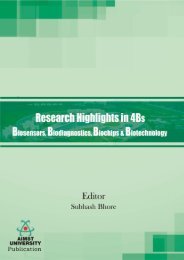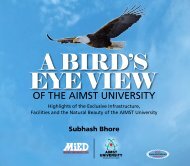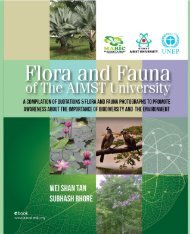Focus on Environment
This book is the Proceedings of the ‘National Seminar on Sustainable Environment and Health 2016’ & ‘World Environment Day-2016 (WED-2016)’ events held on the campus of AIMST University, Kedah, Malaysia. ISBN: 978-967-14475-0-5 (Print version); eISBN: 978-967-14475-1-2 (e-Book version) Editors Subhash Bhore & K. Marimuthu
This book is the Proceedings of the ‘National Seminar on Sustainable Environment and Health 2016’ & ‘World Environment Day-2016 (WED-2016)’ events held on the campus of AIMST University, Kedah, Malaysia.
ISBN: 978-967-14475-0-5 (Print version); eISBN: 978-967-14475-1-2 (e-Book version)
Editors
Subhash Bhore & K. Marimuthu
You also want an ePaper? Increase the reach of your titles
YUMPU automatically turns print PDFs into web optimized ePapers that Google loves.
<str<strong>on</strong>g>Focus</str<strong>on</strong>g> Envir<strong>on</strong> (2016)<br />
Sustainable Agriculture through Organic Farming<br />
friendly.<br />
The focus of this study is <strong>on</strong> the<br />
management practice in sustainable<br />
agriculture and organic farming by paying<br />
attenti<strong>on</strong> <strong>on</strong> the envir<strong>on</strong>ment. The<br />
management of sustainable agricultural<br />
practice in Malaysia paddy farming is still in<br />
its preliminary stage (Othman and<br />
Muhammad, 2011; Othman et. al, 2016).<br />
Currently, a popular system in organic<br />
farming in Asia is the System of Rice<br />
Intensificati<strong>on</strong> (SRI) (Uphoff, 2006), which<br />
has been practiced in Malaysia since 2009<br />
by starting at Bandar Baru Tunj<strong>on</strong>g,<br />
Kelantan, and Sik, Kedah. In the c<strong>on</strong>text of<br />
SRI management, the Sri Lovely Farm at<br />
Sik (which is <strong>on</strong>e of the two cases in this<br />
study) was <strong>on</strong>e of the few certified organic<br />
farms in Malaysia in 2013. The knowledge<br />
in implementing the SRI in paddy<br />
cultivati<strong>on</strong> is still limited and, therefore,<br />
more studies are necessary to establish it.<br />
This study is undertaken to understand the<br />
SRI as a sustainable paddy farming practice<br />
by selecting two farms from different states<br />
of West Malaysia. It explores the two<br />
experienced farmers’ practices in managing<br />
their paddy farms by employing the SRI. As<br />
the main objective of the research was to to<br />
understand and identify the sustainable<br />
agricultural practices in organic paddy<br />
farming in Malaysia.<br />
SYSTEM OF RICE INTENSIFICATION<br />
SRI is a method to manage organic farming.<br />
It was developed in Madagascar in 1983 as a<br />
revoluti<strong>on</strong>ary paddy cultivati<strong>on</strong> method to<br />
achieve very high yields with reduced<br />
resources such as irrigati<strong>on</strong> water, fertilizers<br />
and chemicals. The SRI is implemented in a<br />
number of rice-growing countries, including<br />
in China, India, and Myanmar. It is found<br />
that the existing rice varieties have more<br />
genetic potential than that of the previously<br />
Othman and Hasan<br />
thought which can be tapped by altering the<br />
management practices. So far, the SRI<br />
planting tests have been carried out in a total<br />
of 48 countries including in Asia, Africa and<br />
Latin America. Many SRI users reported<br />
benefits such as a reducti<strong>on</strong> in pests,<br />
diseases, grain shattering, unfilled grains<br />
and lodging. Additi<strong>on</strong>al envir<strong>on</strong>mental<br />
benefits stem from the reducti<strong>on</strong> of<br />
agricultural chemicals, water use and<br />
methane emissi<strong>on</strong>s that c<strong>on</strong>tribute to global<br />
warming. SRI is also suitable for highland<br />
paddy farming, and its applicati<strong>on</strong> has<br />
already been expanded to other types of<br />
crops such as sugar cane.<br />
According to Uphoff (2006), paddy<br />
farming applicati<strong>on</strong> using the SRI is based<br />
<strong>on</strong> six main principles as follows: (1) When<br />
(if) transplanting, to start with young<br />
seedlings (two-leaf stage); (2) Plants to be<br />
set out carefully and gently in a square<br />
pattern of the size 25x25cm or wider if the<br />
soil c<strong>on</strong>diti<strong>on</strong> is very good, but this size can<br />
be even wider if the soil is fertile enough, or<br />
<strong>on</strong>ce it becomes more fertile after the SRI<br />
practices; (3) Seedlings are to be<br />
transplanted singly; (4) Rice paddies are to<br />
be irrigated intermittently by keeping<br />
minimum of water rather than c<strong>on</strong>tinuously<br />
flooded; (5) Weeding is to be carried out for<br />
at least twice though the best result can be<br />
obtained from multiple weeding with a<br />
‘rotating hoe’ that actively aerates the soil at<br />
the same time churning weeds back into the<br />
soil to decompose, thereby c<strong>on</strong>serving their<br />
nutrients; and (6) Basic organic fertilizers,<br />
compost or any decomposed biomass are to<br />
be used.<br />
CURRENT ISSUES IN RICE<br />
PRODUCTION<br />
Global warming, envir<strong>on</strong>mental crisis, plant<br />
diseases and pests are the main causes in<br />
disrupting the food producti<strong>on</strong> in many<br />
ISBN: 978-967-14475-0-5; eISBN: 978-967-14475-1-2 39


